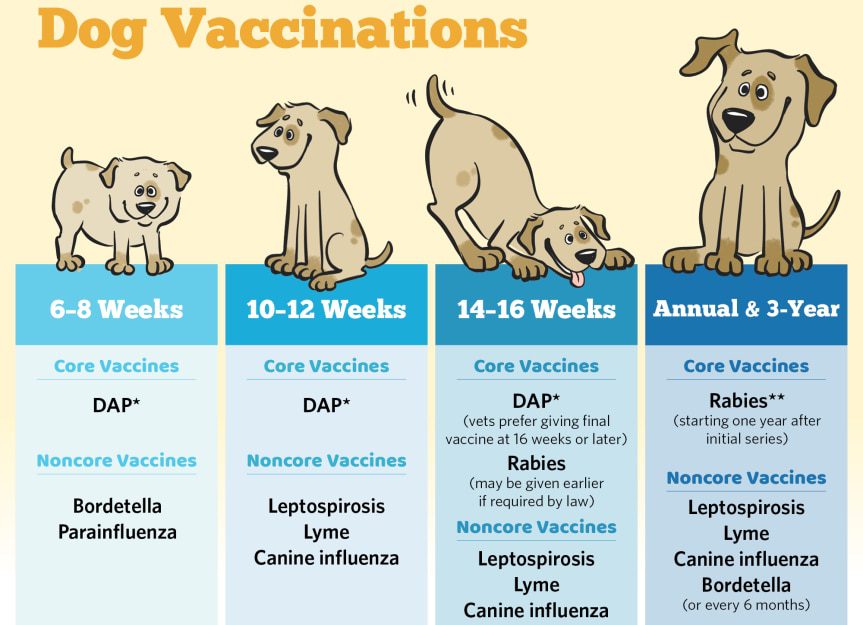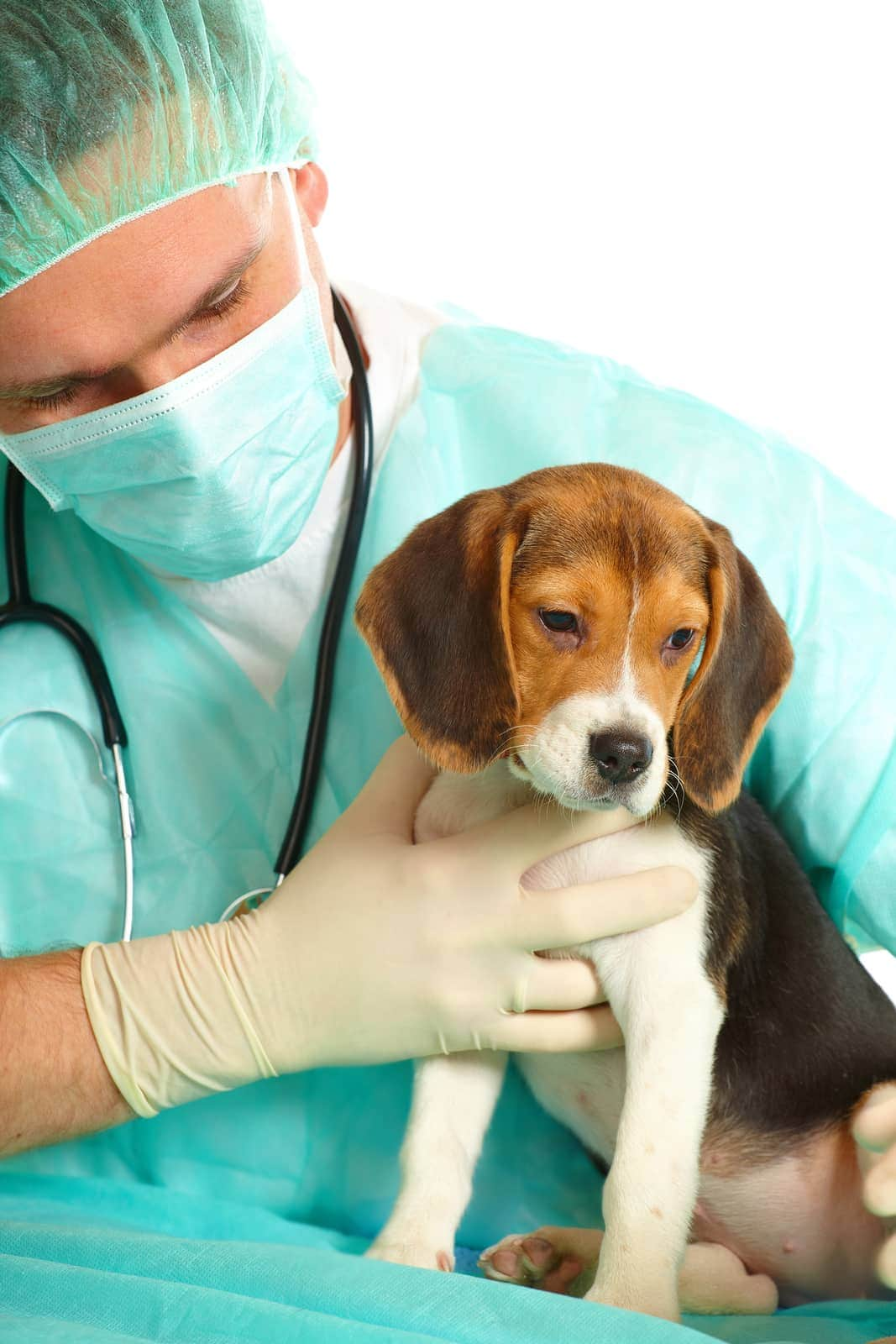
What vaccinations should a puppy get?
The number of vaccinations a puppy needs at an early age can overwhelm any owner. In addition, many are interested in exactly what vaccinations pets need and why.
Vaccination protects your dog from infectious diseases such as rabies and kennel cough by strengthening the immune system.
“Immunity is a complex system of defense mechanisms by which an animal can resist a disease or infection, or at least resist its harmful effects,” VCA Animal Hospitals says. Vaccines, pioneered by Dr. Edward Jenner in the late XNUMXth century and later by Louis Pasteur in the late XNUMXth century, protect animals and humans from pathogens. They contain antigens that trigger the body’s immune response.
Since vaccination is the puppy’s first encounter with the causative agent of the corresponding disease, it provides the body with the opportunity to accumulate antigens to fight this disease. It also ensures that the dog’s immune system will respond more quickly to it in the future. However, no vaccine gives a 100% guarantee – there is always a chance that a pet can get sick. Vaccination of a dog is essential for its health and proper development.
Contents
What vaccinations do puppies need?
When planning your pet’s vaccination schedule, keep in mind that the vaccination approach is not universal for all dogs. Together with the veterinarian, you need to draw up a schedule that will be most optimal for the puppy, taking into account his age, health status, lifestyle and other factors.
There are seven most common diseases against which puppies are vaccinated. More about them – below.
Rabies vaccination for a puppy
The deadly rabies virus, which can infect all mammals, including humans, is at the top of the list of diseases that puppies are vaccinated against. Bats, raccoons and other wild animals, including stray dogs and cats, often carry this virus. When infected, usually by a bite or contact with the saliva of a sick animal, the virus enters the dog’s spinal cord and brain.
Rabies vaccination is mandatory worldwide. According to the American Veterinary Medical Association, vaccination is a successful and effective method of protecting the majority of pets from this disease. Therefore, in this case, vaccination is important not only for the dog, but also for the safety of other animals.
Distemper vaccination for puppies
This is another highly contagious viral disease called canine distemper. It is transmitted by airborne droplets, so dogs can easily infect each other. Once infected, the disease can progress, affecting the brain, lungs, and intestines.
Any pet can become infected with distemper. However, according to the Pet Health Network, puppies are particularly susceptible to infection because their immune systems are not yet fully developed. Accordingly, it is extremely important to consult a veterinarian before adopting a puppy.
Unfortunately, there is no cure for distemper. Therefore, it is vaccination that plays a decisive role in the prevention of this infectious disease.
Parvovirus vaccine for puppies
Parvo is a virus that usually infects the smallest unvaccinated puppies. This disease is fatal, but it is treatable.
“As much as you’d like to take your new four-legged friend with you everywhere, it’s extremely important to protect your puppy’s health that you keep him safe from any risks until he has received all the necessary vaccinations against this life-threatening disease.” warns the American Kennel Club. Until the completion of the vaccination cycle, do not take your puppy to places that create a high risk of infection with this virus, such as dog parks and kennels.
Puppy leptospirosis vaccine
According to the University of Illinois College of Veterinary Medicine, leptospirosis is the most common zoonotic disease in the world. A zoonosis is a disease that usually occurs in animals but can be transmitted to humans.
Leptospirosis is contagious because its pathogens live in water contaminated with infected urine. Because the disease affects the kidneys, the bacteria multiply there and are then shed when an infected animal urinates. Pets who periodically drink water from unknown or unsafe sources are at risk of infection.
Dogs can become infected by drinking water from streams, rivers, lakes, and other sources. It can also be caused by contact with wild or farm animals that carry Leptospira bacteria. However, one should not relax if the dog is rarely in the forest – the incidence of leptospirosis is growing rapidly in all regions of the world.
Puppy kennel cough vaccine
To prevent infectious tracheobronchitis of dogs, which is more often called dog or kennel cough, vaccination is also carried out. This upper respiratory disease in dogs is highly contagious.
Bordetella is a bacterium that lives in the upper respiratory tract, researchers from UofI report. If the pet is in foster care or other areas with high animal populations, this vaccine is especially important. It only protects against Bordetella bacteria, but it should be remembered that there are still a great many other bacteria and viruses that can cause a pet to cough.
You should talk to your veterinarian about vaccinating your puppy against kennel cough if he will be staying in foster care or seeing a lot of other dogs.
Do dogs need to be vaccinated against canine flu?
If an outbreak of canine flu has been registered in the region, and the pet often meets other dogs, it should be vaccinated.
The Cornell University College of Veterinary Medicine notes that animals that have lived in shelters or dog kennels are common carriers of the virus. This vaccine is not classified as a core vaccine and is not required for puppies. For this reason, it should be considered to include it additionally in the vaccination schedule, especially if the pet will visit places where animals congregate.
Consultation with a veterinarian
Another important note: if a four-legged friend is sent abroad, it is necessary to vaccinate him in accordance with the requirements in force in the country of arrival. Sometimes hotels and boarding houses for dogs also set internal requirements for the vaccination of their four-legged guests and, in the absence of appropriate vaccinations, the pet will simply not be accepted.
Some dogs develop adverse reactions to certain vaccines, so any unusual symptoms or signs should be monitored.
In close cooperation with the veterinarian, the owner will definitely develop the most optimal vaccination schedule for the puppy. It will take into account the risks of infection and will help to improve the health of the pet throughout his happy life.






